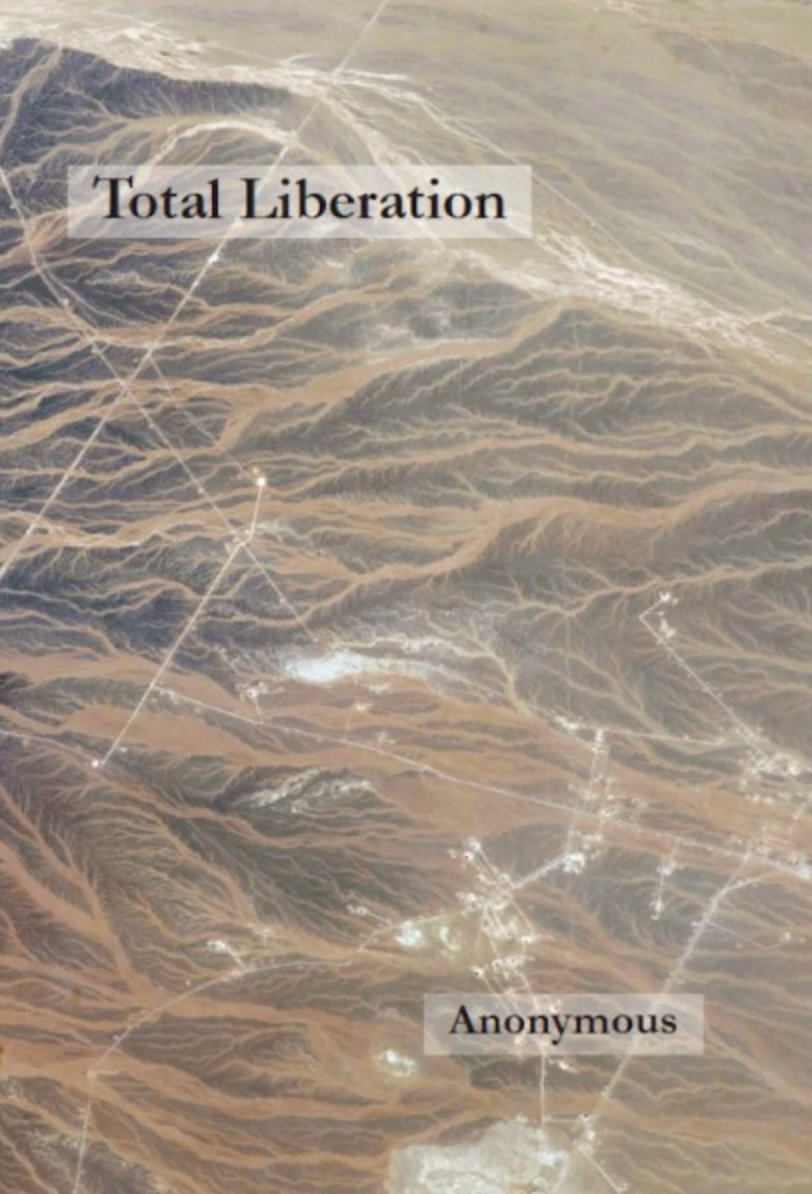In a world with no centre of power, where can we as anarchists direct our rage? Previously there have been kings, lords or factory bosses who we could identify as the enemy. But in this nebulous world of capital, our enemy is an entire system and an internalised psychology that needs new strategies to resist. This is the quandary that Total Liberation, published anonymously in 2019, confronts.
To bring us up to speed Total Liberation provides a brief history of radical ideology. An anarchist critique of Marxism as narrow-mindedly focussing on class is easy, and turns over no new stones. However it also provides a valuable critique of more modern identity politics and its obsession with atomising and itemising oppressions, that have won mostly liberal reformist victories.
Instead Total Liberation draws its inspiration from Murray Bookchin’s social ecology. However while Bookchin was unfairly dismissive of anarchism, and particularly antispeciesism, the author distils from these polemics a holistic understanding of the existential threats to the planet, and goes a step further by applying it to anti-speciesism and biocentrism. It therefore straddles a complex understanding of hierarchy to show that not only are all fights interconnected, they also ultimately have a common enemy.
However just as there is no central focal oppression, there is also no focus of power against which to direct our efforts. Our fight must therefore be similarly decentralised, comprised of autonomous affinity groups and rather than the large unions and political parties of the early 20th century. Total Liberation therefore provides hope to anarchists – these tactics are our bread and butter and should come naturally. Indeed, it often uses the examples of the ALF and ELF to illustrate how cells of individuals have inflicted millions of pounds of costs to heavy industry. Total Liberation does perhaps overstate the revolutionary potential of sabotage actions. That is, however much money such actions cost ecocidal industries, these industries do still exist and are constantly expanding. We need to recognise that either these actions need to be overwhelmingly more widespread, or massively more destructive.
The biggest challenge it provides to anarchism, however, is that in the face of the climate crisis, we really are fighting for our lives. No matter how insulated we are from it, almost everyone’s lives will be radically altered by global warming. It predicts a future not too far away when capitalism will not be able to put food on the shelves, a rather prescient observation considering the pandemic that was to come less than a year after this book was published. We must therefore work to build alternatives to live by, that will provide for the material and social needs of people by providing food, shelter and care without the state. As much promise we can find in our social centres and autonomous zones, the author identifies the need for such spaces to not just be refuges for radicals, but bases from which to organise and create our alternatives outside the state.
At this point Total Liberation draws inspiration from the seminal eco-anarchist book Desert, and calls for recognition that for better or worse, catastrophic climate change has already begun and is irreversible – a terrifying opportunity for us. Although it will likely create space for fascism to flourish and industry to develop into previously frozen landscapes, it will also create the space for anarchist revolution. The author highlights the success of the Rojava revolution in doing so – undoubtedly inspirational but does gloss over the terrible cost of the Syrian civil war, and also the revolution’s dependence western state power. This criticism is a nitpick, however. The point is revolutions never fit a perfect plan and nor should they. We should be dynamic and adapt to our local needs. It is an intimidating realisation that everything we want really is in our reach. The question is whether we have the courage to organise now and seize the opportunities as they arise.
Total liberation sums it up best with this passage:
“Within such an unforgiving context, it is necessary to take a side. That can be done with courage and purpose, or we could resign ourselves to getting swept up yet again, only this time by the most genocidal of centuries… Waging war with the system of death, far from being a matter of declaration, merely faces up to the reality that already engulfs us.”



Is this Total liberation available for reading somewhere online?
Yes!
https://theanarchistlibrary.org/library/total-liberation-anonymous-english